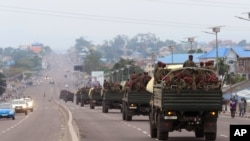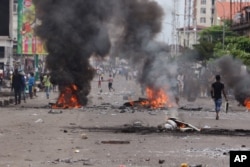At 1 a.m. Friday, weary members of several Congolese opposition parties emerged from a meeting that lasted almost 12 hours. Political talks in the Democratic Republic of Congo have resumed after being suspended early last week, following two days of deadly protests on the streets of Kinshasa.
But it is unclear whether the talks can be productive. A larger coalition of opposition parties — known as the Rassemblement, or the Assembly — still refuses to participate. The highly influential Catholic Church — known as CENCO — has also withdrawn, saying it will only return if the Rassemblement joins the talks.
"Without CENCO and the addition of new opposition parties, the dialogue will lack credibility,” said Stephanie Wolters of the Institute for Security Studies Africa. “There are two very difficult issues that have to be worked out: notably, the date of the elections and the explicit language in the accord — which isn't in there now — about [President Joseph] Kabila not standing for another term. If we see an accord signed by the parties participating which doesn't include language about Kabila not standing or puts the date of elections in 2018, we'll be right back at zero. No one is going to accept that."
The Rassemblement argues that the talks are simply a means for Kabila to delay elections, which were slated for November, and stay in power beyond the constitutionally defined two-term limit.
The government says the talks are aimed at reaching an agreement on how the DRC should proceed to credible elections.
An opposition faction led by Vital Kamerhe is taking part. The faction says Kabila can remain in power, leading an interim government, until the next presidential election but insists that he must not stand as a candidate in it.
Protesters targeted
Meanwhile, Congolese authorities appear to be continuing their crackdown on those who participated in the protests Sept. 19 and 20, during which the U.N. says more than 50 people were killed.
Georges Kapiamba, the president of the Congolese Association for Access to Justice, says more than 1,800 people were arrested throughout the DRC during and after the protests, and 110 have been given sentences ranging from 45 days to 25 years. In addition, he says, the accused were convicted in trials lasting only 40 minutes, and their lawyers were not given time to become acquainted with the cases against them.
At least 34 children have been detained and are being kept in cells with hardened criminals, including murderers, according to Kapiamba.
The United States this week imposed sanctions on two Kabila aides it accuses of repressing human rights and blocking the organization of elections.











